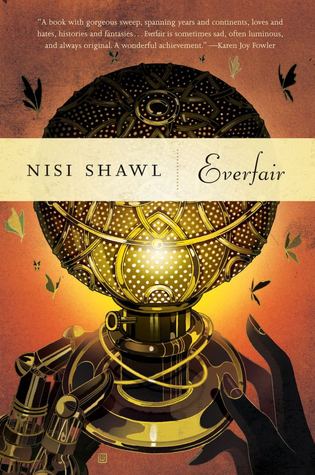Everfair by Nisi Shawl is an alternative history set in the Belgian Congo during King Leopold II’s reign. Instead of years of slavery, racism, and genocide a congregation of Fabian Socialist from Great Britain and African-Americans form their own nation called Everfair and resist Leopald’s subjugation and return to slavery. Though alternative history is not in my main repertoire, the novel’s idea of an alternative timeline that results in a happier ending for the Congo is fresh to me.

The nation of Everfair is founded by a blend of different ethnicities, religions, sexualities, and nationalities intending to form one free of prejudices. This, however, is easier said than done. Though they have good intentions in forming Everfair the characters are unable to let go of their nationalism, misogyny, racism, and homophobia. This, besides the military ones, makes up a large part of the novel’s conflict.
Beginning in 1889, the plot spans over 30 years and details the lives of many point-of-view characters of different backgrounds and beliefs, a modern standard for fantasy novels but for those not coming from that genre may find it jarring. In the beginning, the characters range from uninteresting such as Daisy Albin to unlikeable, such as Marthia Livia Hunter. However, once they all begin to coalesce in Everfair and the conflict with King Leopold II reaches the maximum of tension the reader’s affection and concern for the characters will grow. This growth is aided by the books take on the passage of time.
Each chapter jumps in time by years which both hinders and aids the story. Key events such as the establishing of the nation and the three wars that take place over the novel are quickly resolved missing key details but it helps the story from slowing down by too much exposition. Without it, the characters do not lose the spotlight as they age and change. Alongside the time jumps, the development of steam punk technology using the resources found around Evefair, such as the rubber trees, goes through establishing an advanced nation that other nations cannot compete with. Here is where the time jumps aid the story as we see their technology flourish without any infodumps
This may be ideal because if you remove the historical background, the setting, the steampunk elements, the time jumps, and yes, the magic. the characters and their development are what stands out the most. Without those other elements though, this cannot even occur. It reads almost like the worldbuilding and the character development has a symbiotic relationship. As you learn more about the world you also fall in love or grow to dislike the characters.
The novel quickly establishes the complications of a mixed nation in a time not long after the American Civil War. Over the course of ir, Everfair is involved with three military conflicts all involving deep espionage in foreign countries as well as battles that showcase their steampunk advancements. The third conflict that happens at the end may have been wrapped up too quickly due to the time jumps, as I found it the most morally complicated one of the bunch. The conflict left me in a position of asking who is right in this situation? The first two wars in the book are much clearer. The first against King Leopold is against the establishment of slavery in the Congo, making it easy to choose a side. The second, being World War I, mostly takes place in foreign countries and focuses less on the war itself but how the characters are affected by it. The third conflict could be argued is the most important as it is a homegrown one but due the time jumps quickly begins it and ends just as the book is reaching its conclusion. This part of the plot suffers for it.
The characters, however, do not. Well, they do suffer as all war comes with some suffering but their character development does not. The time jumps represent a frustration from a critical eye. A second frustration, which shows the quality of the writing, is wishing the character would make the choices you know would make them happy. One such case is the romance in the book. Each relationship carries a different complication that makes them stand out on their own from the tragic to purely lust based. Even unlikable character such as Martha can be cheered on to find love but the relationship of Daisy and Lisette is the one leaving me shaking my book, wishing for them to be happy and together. Their will they? / won’t they? dynamic is a large crux of the book and Shawl builds that tension masterfully.
A third frustration hearkens back to the prejudices many of characters can’t let go. Their racism, misogyny, homophobia, or nationalism supersede their good sense and it can be compared to that one uncle you love but he just had to go and say that problematic thing at Thanksgiving. You love these characters but their choices because of their preconceived notions based on prejudice will anger you. It can be difficult to divorce modern conception of tolerance from the time period. Old prejudices not being able to let go of will be the downfall of the nation which I was surprised to find wasn’t part of the conclusion of the novel. Religion, cultures, race, sexual orientation, and gender are all explored through characters that are accepting of the differences and those who are not.
Nisi Shawl’s Everfair is a character driven alternative history steampunk novel with a bit of magic thrown in that explores social issues in a unique setting. While some elements needed for the world building can be a detriment to giving good details the overall plot is enjoyable, thought provoking, and interesting.
Follow Joshua MacDougall on Twitter @FourofFiveWits.
